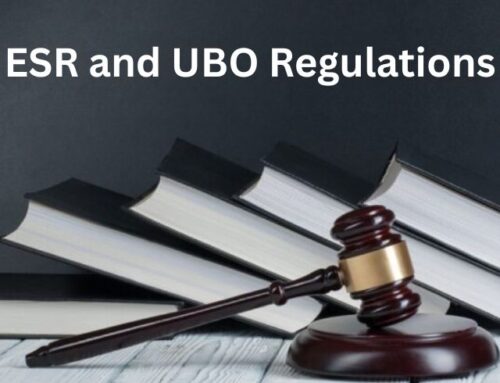Economic Substance Regulations (ESR) in the UAE: Compliance Guide
The United Arab Emirates (UAE) has long been recognized as a global hub for business and investment due to its favorable tax environment. However, to align with international standards set by the Organisation for Economic Co-operation and Development (OECD) and the European Union (EU), the UAE introduced the Economic Substance Regulations (ESR) in 2019.
The ESR requires certain businesses operating in the UAE to demonstrate sufficient economic substance in the country. In other words, companies must show that their profits are aligned with their actual economic activities within the UAE, rather than being shifted from other jurisdictions for tax benefits.
In this guide, we’ll explain what the Economic Substance Regulations in the UAE mean, which businesses are affected, the compliance process, penalties for non-compliance, and how your company can stay compliant.
What Are the Economic Substance Regulations (ESR)?
The Economic Substance Regulations (Cabinet Resolution No. 31 of 2019), later amended by Cabinet Resolution No. 57 of 2020, ensure that companies in the UAE report real business activity in line with international tax fairness standards.
The ESR requires relevant entities engaged in certain business activities to:
- Maintain adequate presence in the UAE.
- Conduct Core Income Generating Activities (CIGAs) locally.
- Be directed and managed from the UAE.
- File annual ESR reports to the UAE Ministry of Finance.
Who Needs to Comply with ESR in the UAE?
Not all companies fall under ESR. The regulations apply to businesses engaged in the following Relevant Activities:
- Banking Business
- Insurance Business
- Investment Fund Management Business
- Lease-Finance Business
- Headquarters Business
- Shipping Business
- Holding Company Business
- Intellectual Property (IP) Business
- Distribution and Service Centre Business
If your company carries out any of these activities, you must file an ESR notification and, if applicable, submit a full ESR report.
Key Compliance Requirements for ESR in the UAE
To be considered compliant with the Economic Substance Regulations, companies must meet the following criteria:
1. Directed and Managed in the UAE
- The company must hold board meetings in the UAE.
- Meeting minutes must be signed and retained in the UAE.
- A quorum of directors should be physically present in the UAE.
2. Core Income Generating Activities (CIGAs)
- The company must conduct its main profit-generating activities in the UAE.
- Examples:
- For banking: taking deposits, managing risks.
- For IP business: research and development, trademark licensing.
- For distribution & service centers: storage, transport, and processing of goods.
3. Adequate Staff, Office, and Expenditure
- Employ qualified employees in the UAE.
- Maintain physical offices or premises.
- Incur adequate operational expenditure within the UAE.
4. Annual ESR Reporting
- ESR Notification: All entities carrying out a relevant activity must file an annual notification with the Ministry of Finance.
- ESR Report: If earning income from relevant activities, a full report must be filed within 12 months after the end of the financial year.
Penalties for ESR Non-Compliance in the UAE
Failure to comply with ESR can result in severe financial penalties and regulatory consequences:
- Failure to submit ESR Notification: AED 20,000 fine
- Failure to submit ESR Report: AED 50,000 fine
- Failure to meet ESR Test: AED 50,000 (first year), AED 400,000 (subsequent year)
- Provision of inaccurate information: AED 50,000 fine
- Possible suspension, revocation, or non-renewal of trade license
Non-compliance can also trigger information exchange with foreign tax authorities, creating reputational and financial risks for businesses.
Step-by-Step Guide to ESR Compliance
- Assess Your Business Activities
- Determine if your company conducts any Relevant Activities.
- File ESR Notification
- Submit your annual ESR notification via the Ministry of Finance ESR portal.
- Prepare for ESR Test
- Ensure board meetings, CIGAs, and adequate resources are in the UAE.
- Maintain Documentation
- Keep records of staff, expenses, office leases, and business contracts.
- File ESR Report
- Submit the full ESR report if your company earns income from relevant activities.
- Engage Legal & Compliance Experts
- Seek professional advice from a corporate lawyer in Dubai to avoid mistakes and penalties.
How Falcon Law Can Help with ESR Compliance
At Falcon Law, we specialize in guiding businesses through UAE Economic Substance Regulations. Our services include:
- Assessing whether your business falls under ESR.
- Drafting and filing ESR notifications and reports.
- Advising on compliance with ESR tests.
- Representing businesses in case of disputes with authorities.
With our team of corporate lawyers in Dubai, you can ensure your company remains fully compliant while focusing on growth.
Final Thoughts
The Economic Substance Regulations (ESR) in the UAE are designed to promote transparency and fair taxation. If your company conducts any of the listed Relevant Activities, it is crucial to file your ESR notification and report on time, and to maintain genuine economic presence in the UAE.
Failing to comply can result in heavy fines, reputational damage, and legal consequences. By working with experienced corporate lawyers in Dubai like Falcon Law, you can stay compliant and avoid unnecessary risks.
Contact Falcon Law today for a consultation on ESR compliance in the UAE.





